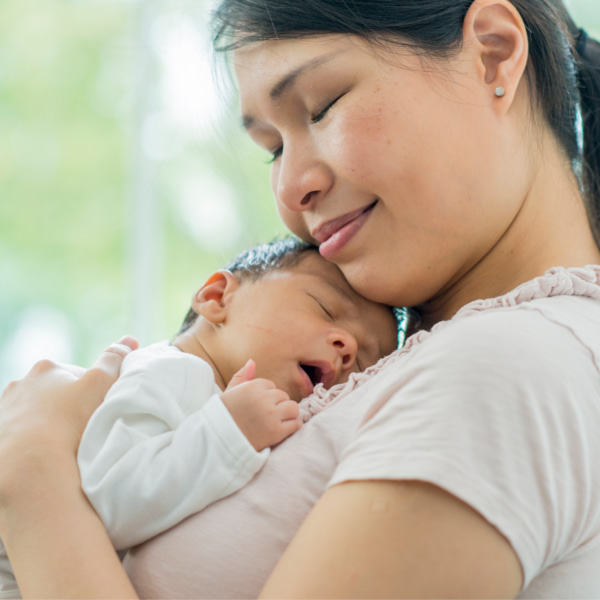Changes to maternity services
Due to coronavirus there may have been changes to the maternity services provided. The NHS are confident you’ll continue to receive maternity care throughout your pregnancy, but don’t be afraid to raise any worries with your midwife. It’s also important to remember that these changes are to keep you, your baby, and your community safe. Visit NHS Inform to find out more.
Being in a priority group
The risk to you if you're pregnant or to your newborn baby following COVID-19 infection is generally low. However, if you're pregnant you're more likely to have severe COVID-19 infection if you:
- have underlying health conditions (for example diabetes, high blood pressure or asthma)
- are overweight
- are of Black and Asian Minority Ethnic background
- are aged 35 years or over.
If you’re pregnant and get COVID-19 with symptoms, it is two to three times more likely that your baby will be born prematurely.
Therefore it’s recommended that you take extra care when you’re out and about and get all doses of the COVID-19 vaccine when you're offered it. You can find out more about the pregnancy and the COVID-19 vaccine here.
Should I attend my antenatal and postnatal appointments?
Yes – It's really important that you keep going to your appointments when you're well. Some appointments might be by Near Me video call. Attending your appointments will help your maternity team take care of you and your baby.
You should continue to follow health advice during your pregnancy. This includes keeping track of your baby's movements and calling your midwife or maternity unit right away if you're concerned about your physical or mental health or the health of your baby.
It is also important to go to any vaccination appointments during your pregnancy and when your baby arrives.
Please speak to your midwife to find out about antenatal classes in your area.You can also access free Solihull Approach Online courses for parents at www.inourplace.co.uk, including courses on understanding pregnancy. Use the code TARTAN to get free access. You can then discuss the content with your midwife at your next appointment.
Can I have someone with me for hospital appointments?

Pregnant couple smiling
A birth partner supporting you during appointments continues to be categorised as an essential visitor, so you can be accompanied throughout your time in maternity settings. This includes accompanying to certain appointments (booking appointment, 20 week scan and any emergency appointments), induction, labour and birth including C-sections (except where general anaesthetic is required) and visits to the postnatal ward after delivery. Some hospitals may however have implemented time restrictions for visits to postnatal wards to ensure physical distancing subject to local risk assessment.
If you need additional support, you can be accompanied by a carer, advocate, translator or parent (in the case of a minor).
Face coverings and physical distancing will still be required for both yourself and your supportive person during all hospital visits. Smaller waiting areas may have further restrictions.
Are there any procedures for going to the maternity unit?
When you, your birth partner or key visitor are attending the maternity unit for appointments or when your baby is due, you should all wear face coverings if you can't maintain a safe distance from other people. Everyone must also stick to strict hand and respiratory hygiene by washing your hands with soap and water, or using alcohol hand gel, before entering and leaving the unit or ward and covering your nose and mouth with a disposable tissue when sneezing, coughing, wiping or blowing your nose. Tissues should be disposed of immediately in the bin and hand hygiene performed immediately afterwards. You can check the guidance for hospital visiting here.
You should follow any instructions about physical distancing and shouldn’t visit other patients or other clinical areas while you’re there.
Should I go to work?
If you’re pregnant, your employer must make sure that there are no risks to you or your unborn baby in the workplace. The ACAS website has more information on your rights at work when you’re pregnant.
What if I have coronavirus symptoms?
If you have symptoms of coronavirus please contact your midwife and ask for advice on going to your routine appointments. Don't reduce your number of visits without speaking with your maternity team first.
Can I get the COVID-19 vaccine if I'm pregnant?
The JCVI have advised that pregnant women should be considered as a clinical risk group (and part of priority group 6 within the vaccination programme).
COVID-19 vaccines are now recommended in pregnancy and everyone who's pregnant will be offered the COVID-19 vaccine at the same time as people of the same age or risk group. Vaccination is the best way to protect against the known risks of COVID-19 in pregnancy for you and your baby. This includes reducing the risk of you being admitted to intensive care and the risk of your baby being born prematurely. It’s important to get all doses to protect yourself against COVID-19.
You can find out more about getting the COVID-19 vaccine when you're pregnant here.
Looking after yourself
It’s okay to feel anxious during pregnancy – it’s perfectly natural. But remember you’re not alone, and that by following the most up-to-date advice can help you and your baby stay safe. Our page on looking after your mental health during pregnancy has more advice.
Can I have additional visitors in hospital?
Hospital visits should be permitted as usual. You can read the Scottish Government's national guidance on hospital visiting to find out more.
Can I have a home birth?
During this pandemic, some birth choices such as the homebirth service were unavailable. However, these restrictions are now changing and all Health Boards should be able to provide all choices to women, including home births. Speak to your midwife or maternity team, who will provide you with up to date information on your options in your area.
Taking your baby home

Photo of a mum holding her baby
If you and your baby are well you’ll be able to go home from the hospital as soon as possible. Before you’re discharged, the maternity team will discuss your postnatal care with you. Your midwife, health visitor and family nurse will support you at home, so you’ll have plenty of help.
If you become unwell in any way once you’re home with your baby, you should contact your GP, midwife or maternity unit.
- For non-emergency concerns call NHS 24 on 111.
- If it's an emergency phone 999.
Don’t worry about ‘bothering’ the doctor or midwife – you’re not!
Caring for your new baby
Very few babies have caught coronavirus. However, it is possible for them to catch it, so in order to be safe it’s best to:
- take your baby home from hospital as soon as it’s safe to do so
- follow government advice on hand hygiene
- keep your baby away from anybody with a cough, fever or who is ill with other symptoms such as a runny nose, vomiting or diarrhoea.
You can find out more about caring for your new baby during coronavirus at the NHS Inform website. There is more advice on coping with the first few days with your new baby here.
Further support
If you have any concerns about the effect of coronavirus on your pregnancy or on your birth plan speak to your midwife. The Royal College of Obstetricians and Gynaecologists website has information about coronavirus and pregnancy. There is also lots of information on the NHS Inform website.
